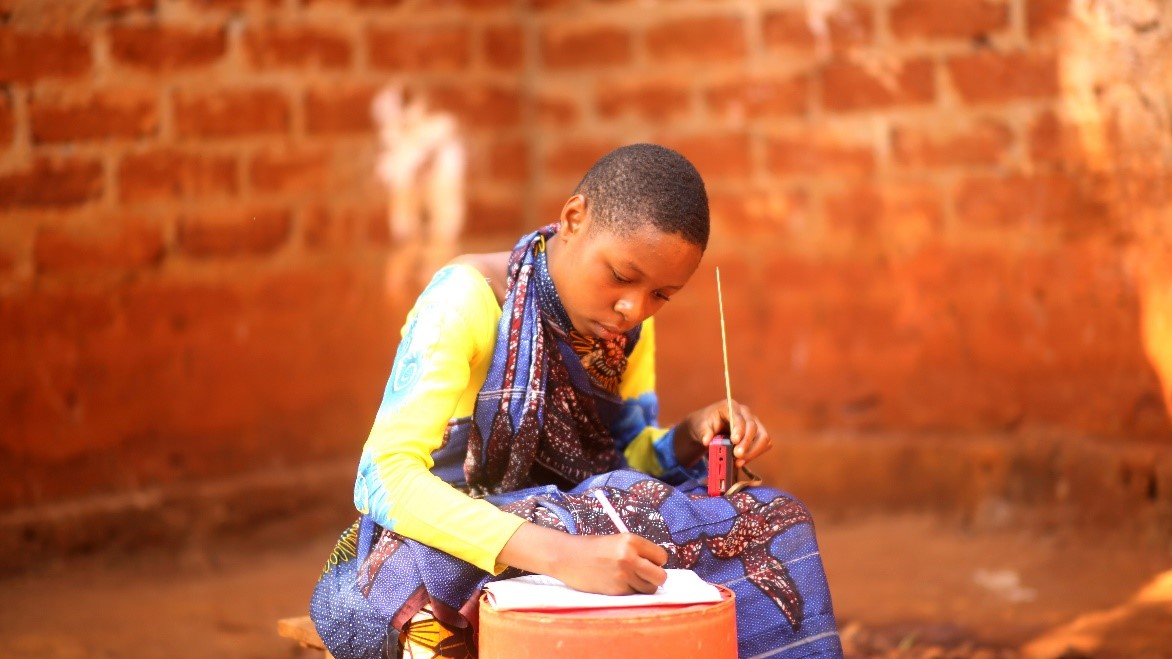Responding to COVID-19 and gender inequalities through Community Radio
News
21 July 2020
Husna Omari (13) a Standard Seven Pupil at Boza Primary School in Pangani District, Tanga Region listening to Kiswahili Class Session through Pangani FM Radio, 10th June 2020.
The Embassy of Ireland in Tanzania puts Gender and Women’s Empowerment at the centre of our work. We recognise the role that gender-based violence (GBV) plays in undermining the health, wellbeing and livelihoods of women and girls, while simultaneously infringing upon their human rights.
Gender-based violence is widespread and common in Tanzania. Data shows that 40% of women and girls in Tanzania aged 15-49 have experienced physical violence and 17% sexual violence in their lifetime. A violence against children survey found that 27.9% of girls had experienced sexual violence before their 18th birthday.
With the COVID-19 pandemic, GBV cases are expected to increase. There is evidence worldwide that disease outbreaks affect women and men differently, and the pandemic will compound existing gender inequalities and increase risks of GBV. In every nation and every community touched by COVID-19, hard-won progress for women and children’s rights risks being reversed.
Tanzania reported its first case of COVID-19 on 16 March 2020. Since then, the government announced a range of measures to curb the spread of the pandemic including closure of schools and higher learning institutions. Experience shows that when schools are closed, and many girls and boys are out of the formal education system this not only disrupts learning but also creates other, gender-specific risks for girls. There is anecdotal evidence in Tanzania suggesting that many girls got pregnant during the time when schools were closed. Due to existing Government policies regarding student pregnancies, there is a likelihood that many girls are at risk of being expelled from school and quite possibly forced to marry.
As part of our response to COVID-19, the Embassy of Ireland has supported our partner UZIKWASA, based in Pangani district, to provide an alternative means of learning for students while at home and at the same time conveying behavioural change messages that might affect the spread of the disease. Using its community radio station Pangani FM Radio, UZIKWASA launched an interactive radio show called Radio Darasa (‘classroom radio’) where teachers conduct lessons on air and students can call in to ask questions. This took place 5 days a week at different times while schools in Tanzania were closed.
Parents who were interviewed applauded UZIKWASA for considering girls who did not have any alternative means of accessing education services during this time of uncertainty. Through Radio Darasa girls could take time to listen and participate in the show, spending time studying rather than engaging in domestic chores. Given the role of women and girls in providing most of the informal unpaid care within their families, the girls in Pangani would most likely have had to do additional care work during this time when the schools are closed. The radio programme is also used to challenge the negative gender norms and unequal power dynamics at household level that often perpetuate domestic violence. It provides a platform for couples to discuss how they have addressed the issues that affect them.


